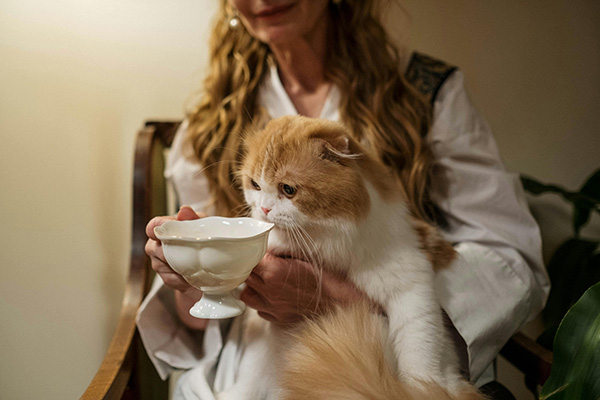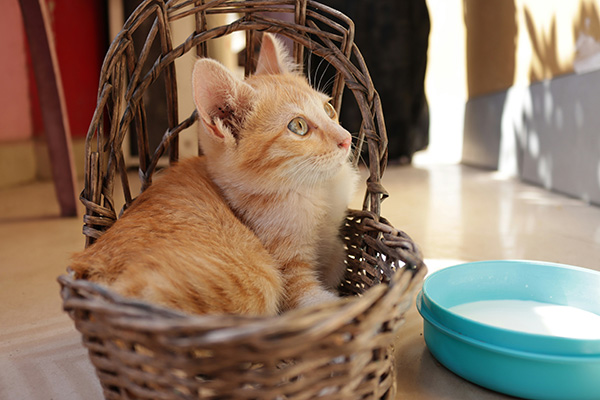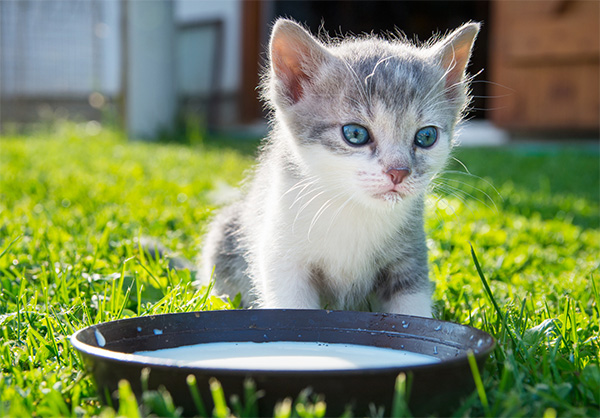The classic image of a cat drinking milk may evoke a sense of nostalgia and warmth, but it masks an underlying dietary issue: many cats are lactose intolerant. Contrary to the picturesque depictions in cartoons and vintage photos, the truth is that most cats do not produce enough lactase, the enzyme required to break down lactose in milk. This deficiency often results in digestive issues such as diarrhea and bloating when cats consume milk.
In this post, we'll explore why cats often struggle with milk, how to identify signs of lactose intolerance in your feline friend, and suitable alternatives to keep them hydrated and healthy without upsetting them.
Understanding Lactose Intolerance in Cats
Lactose intolerance in cats occurs when their digestive system cannot properly process lactose, the sugar present in milk. This condition is surprisingly common, affecting many cats. The primary reason for lactose intolerance is the insufficient production of lactase, the enzyme necessary to break down lactose into simpler sugars that the body can absorb.
Despite the common belief that cats love milk, not all cats can drink milk without experiencing digestive issues. The problem arises because, without enough lactase, the lactose in milk remains undigested and ferments in the intestinal tract, leading to discomfort and other symptoms. This widespread misconception has led many cat owners to unknowingly include milk in their cats' diets, potentially harming them.
Recognizing lactose intolerance in cats helps ensure their health. Well-informed cat owners can make better dietary choices, helping to prevent discomfort and potential health problems for their pets.
Common Symptoms of Lactose Intolerance in Cats

When a cat ingests milk and cannot digest lactose, it can lead to unpleasant symptoms. One of the cats' most common signs of lactose intolerance is diarrhea, which can occur within eight to twelve hours after consuming milk. This occurs because undigested lactose pulls water into the intestines, causing loose stools.
In addition to diarrhea, lactose-intolerant cats may also experience vomiting and gastrointestinal upset. When undigested lactose ferments in the intestines, it can create gas, resulting in bloating, painful cramps, and abdominal discomfort. These symptoms can cause significant distress for your cat and may lead to dehydration if not properly managed.
Owners should watch for these symptoms, which indicate lactose digestion issues. Noticing these signs after milk consumption calls for dietary reconsideration to avoid future problems.
Why Do Adult Cats Develop Lactose Intolerance?
As cats grow older, their ability to digest lactose declines. This is because lactase production, the enzyme necessary for breaking down lactose, decreases with age. This natural reduction in lactase production is why most adult cats develop lactose intolerance and cannot properly digest milk.
The severity of lactose intolerance varies from cat to cat. Some cats can produce enough lactase to handle small quantities of milk without issue, while others may react severely, even to a tiny amount. These differences stem from genetic variations that affect lactase production in their bodies. It is crucial to recognize that lactose-intolerant cats may experience discomfort when consuming dairy products.
This process reveals that milk, though seemingly a treat, is unsuitable for adult cats. Awareness of digestive changes with age allows owners to make healthier pet dietary choices.
The Risks of Feeding Regular Milk to Cats

Feeding regular milk to cats can pose several health risks. One major issue is gastrointestinal distress, which can result in symptoms such as vomiting, diarrhea, and abdominal pain. These symptoms can be quite distressing for your cat and may require veterinary attention if severe.
Another risk is that cow’s milk contains high levels of fat, which can lead to obesity in cats. Obesity is a major health concern that can result in additional complications, including diabetes and joint issues. Many cat owners mistakenly believe milk is a healthy part of a cat’s diet, but this is far from the truth. Cow’s milk lacks the essential nutrients that cats require and can cause various health issues.
Although some cats are drawn to milk for its fat and protein content, it’s important to resist feeding them regular milk due to its downsides. A meat-based cat’s diet that meets its nutritional needs is a healthier choice.
Safe Alternatives to Cow's Milk for Cats
While regular cow’s milk is unsuitable for cats, several safe alternatives are available. These alternatives cater to the lactose intolerance common in most adult cats and allow them to enjoy a milk-like treat without adverse effects. Options include lactose-free milk, special cat milk formulas, and certain dairy products that are easier to digest.
These options allow your cat to enjoy milk-like treats without digestive issues. Always consider the lactose content in any dairy products and milk sugar to prevent health problems.
Lactose-Free Milk for Cats
Lactose-free milk is a safe and popular option for cats. Known as ‘cat milk,’ these products are usually formulated to be lactose-free, including added enzymes that help with digestion. This means your cat can enjoy the taste of cat lactose-free milk without the associated digestive problems, making it a great occasional treat.
Special Cat Milk Formulas
Specialty cat milks in pet stores are crafted for feline consumption. Usually lactose-free, they often contain taste enhancers and thickeners for better texture and flavor, appealing more to cats.
Other Dairy Products
Other dairy products can also be suitable for cats, provided they are given in moderation. Unpasteurized plain yogurt, cheddar, and cottage cheese are examples of dairy items that some cats can tolerate better due to their lower lactose content.
These should be given only occasionally and in small quantities to prevent digestive problems.
What Should Cats Drink Instead of Milk?
Fresh water is the best beverage for cats. Ensuring your cat has access to clean, fresh water is essential for their well-being and helps prevent dehydration. Encourage more water intake by offering it in various forms, like a dripping faucet or ice in their bowl.
Including wet food in your cat’s diet can boost their overall water consumption, making it a beneficial addition. For cats reluctant to drink water, flavored liquids like chicken broth or tuna juice can be enticing and help keep them hydrated.
These alternatives ensure that your cats drink milk and remain hydrated and healthy without the risks associated with milk.
Can Kittens Drink Milk?

Kittens are a different story when it comes to milk. Born with the ability to digest lactose, kittens can drink their mother’s milk without any issues. However, this ability diminishes around eight weeks of age as they gradually lose the enzymes needed to process lactose.
Commercial kitten milk formulas offer balanced nutrition for orphaned or nursing kittens. Transitioning to solid food as they mature helps avoid future lactose intolerance.
Knowing the distinct nutritional needs of kittens and adult cats ensures they receive age-appropriate diets, promoting their overall health and well-being.
Treating Lactose Intolerance in Cats
If your cat exhibits signs of lactose intolerance, such as vomiting and diarrhea, stop giving it milk immediately. Severe symptoms, such as prolonged diarrhea or intense sickness, require a veterinary visit for proper care.
In the meantime, remove all pasteurized milk products from your cat’s diet and provide access to clean, fresh water to help it recover. It is important to monitor your cat’s health and adjust its diet accordingly to prevent future instances of lactose intolerance.
Frequently Asked Questions
Are all cats lactose intolerant?
As cats age, many lose the ability to digest lactose, making lactose intolerance a common issue in adulthood. Therefore, caution should be exercised when considering dairy products for cats.
What are the symptoms of lactose intolerance in cats?
Symptoms of lactose intolerance in cats usually involve diarrhea, vomiting, bloating, and abdominal pain. It's important to watch for these signs to address any dietary concerns promptly.
Can I give my cat any kind of milk?
It is advisable to avoid regular cow's milk for your cat. Instead, choose lactose-free cat milk or specially formulated cat milk products.
Can kittens drink milk?
Kittens can drink their mother's milk and specially formulated kitten milk, but after about eight weeks, they typically lose the ability to digest lactose effectively. It's best to avoid giving them regular cow’s milk, as it can lead to digestive problems.
What should I do if my cat shows signs of lactose intolerance?
If your cat shows signs of lactose intolerance, cease all milk consumption and ensure it has access to fresh water. Should symptoms persist or worsen, consult a veterinarian.
